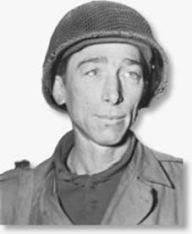Alexander A. Drabik
Alexander Albert Drabik | |
|---|---|
 Alexander A. Drabik, Sgt., US Army | |
| Born | December 28, 1910 near, Holland, Springfield Township, Lucas County, Ohio |
| Died | September 28, 1993 (aged 82) Columbia, Boone County, Missouri |
| Place of burial | Resurrection Cemetery, Toledo, Lucas, Ohio |
| Allegiance | |
| Service | |
| Years of service | 1942–1945 |
| Rank | |
| Unit | |
| Battles / wars | World War II |
| Awards | Distinguished Service Cross Purple Heart |
Sgt. Alexander Albert Drabik (December 28, 1910 – September 28, 1993) was the first American soldier to cross the Ludendorf Bridge over the Rhine river at Remagen, Germany in World War II.[1][2] He led two other enlisted men across the bridge, running 398 metres (1,306 ft) while under fire, knowing that the demolition charges attached to the bridge could be detonated at any moment. He was awarded the Distinguished Service Cross for his action.
Biography
Drabik was the son of John D. and Frances (née Lewandowski) Drabik, Polish immigrants from Szymborze, Germany, now Poland.[3] They raised thirteen children on a farm near Holland and Toledo, Ohio.[4][5] Alex, youngest son of 14 children, attended Dorr Street School. He enlisted in the United States Army in October 1942.[6] Prior to his enlistment, he worked as a butcher in Holland, Ohio.[7]
Military career
Early in his military career, he distinguished himself by rescuing 120 recruits who had become lost in the California desert.[8] Drabik was seriously wounded during the Battle of the Bulge.[9]
Squad leader Drabik, part of Able Company, 27th Armored Infantry Battalion, Combat Command B, 9th Armored Division received orders from Company commander, Lt. Karl H. Timmermann to assault the Ludendorff Bridge near Remagen on March 7, 1945, in an effort to seize and hold it.
Under heavy machine-gun fire, Drabik dashed across the bridge while Germans tried desperately to detonate it. He lost his helmet on the way. Drabik was the first American soldier to reach the east side of the bridge. For his heroism, Drabik was awarded the Distinguished Service Cross.[10] U.S. Representative Marcy Kaptur (D-OH) has repeatedly sponsored legislation to award him the Medal of Honor.[4]

Drabik later said:[11]
We ran down the middle of the bridge, shouting as we went. I didn't stop because I knew that if I kept moving they couldn't hit me. My men were in squad column and not one of them was hit. We took cover in some bomb craters. Then we just sat and waited for others to come. That's the way it was.

On August 18, 1945, Toledo honored him and his commanding officer, Maj. Gen. John W. Leonard, with a parade.[4]
Decorations

| |||
Death
Drabik was killed in an auto accident in 1993, en route to a reunion of his unit.[1]
In media
The book Hechler, Ken (2004). Hero of the Rhine: The Karl Timerrmann Story (1st ed.). Pictorial Histories. ISBN 978-1-57510-110-1. mentions Drabik.
Drabik is referenced in a Hollywood film inspired by a book written about its capture, The Bridge at Remagen, was made in 1969. The actor George Segal played the character Lieutenant Phil Hartman, based on Lt. Timmermann. Ben Gazzara as Sergeant Angelo was based on Sgt. Alexander A. Drabik the first soldier across the bridge.[12][13]
References
- ^ a b Obituary, "Alexander Drabik, 82, First G.I. To Cross Remagen Bridge in 1945", The New York Times, 1993-10-02.
- ^ Orientation Branch, Information and Education Services, Headquarters, Theater Services Forces, European Theater, "The 9th: The Story of the 9th Armored Division" (Stars & Stripes: Paris 1945).
- ^ Marker #59-48, Birthplace of Alexander Drabik Archived 2015-09-24 at the Wayback Machine, Ohio Historical Society
- ^ a b c Ryan E. Smith, "Dash over Rhine bridge sealed the Nazis' defeat", Toledo Blade, 2005-03-06.
- ^ "First GI to Cross Rhine Unterrified By Lorelei Maiden", Stars & Stripes London Edition, 1945-03-12 at 1.
- ^ "Remarkable Ohio". Archived from the original on 2015-09-24. Retrieved 2015-03-09.
- ^ University of Toledo Veterans History Project audio file.
- ^ Toledo Veterans History Project audio file at 4:20.
- ^ Toledo Veterans History Project audio file at 5:00.
- ^ Remagen | photography
- ^ Howard Langer, World War II: An Encyclopedia of Quotations, p. 206 (1999) ISBN 0-313-30018-6.
- ^ "American film-makers use Austrian tanks in Most". Retrieved 24 August 2012.
- ^ "Demolition and construction of the city" (in Czech). Retrieved 28 August 2012.
